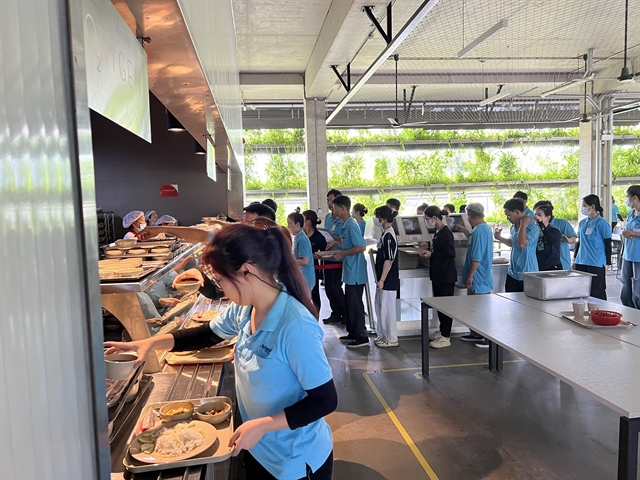Bình Dương firms increase worker recruitment for year-end
Society – Economy - Ngày đăng : 21:54, 10/12/2024
 |
| Workers at the Bowker Việt Nam Garment Factory Co., Ltd in Đồng An 1 Industrial Park in Thuận An City in Bình Dương Province. – VNA/VNS Photo Chí Tưởng |
BÌNH DƯƠNG – Businesses in Bình Dương Province are recruiting more workers, especially manual workers, to complete their year-end orders.
They are seeking 6,000 workers in the last two months of this year, including 5,500 manual workers, according to the province Department of Labour, Invalids and Social Affairs.
The province’s job transaction floors aim to introduce jobs for 8,000 labourers in the last two months of this year and about 5,000 of them are expected to find suitable jobs, it said.
These job transaction floors have offered to recruit 66,954 job positions so far this year, including 57,756 manual jobs.
Female workers accounted for up to 63.4 per cent of recruited manual workers because they possess advantages in the garment, technical, information technology, and management sectors.
There is a high demand from firms for workers this year but only 46.7 per cent of 67,209 labourers who were introduced jobs this year were recruited, indicating that the province’s labour force has not met the demand of businesses.
To solve this issue, the province’s job services centres have taken various measures, such as organising 36 job introducing sessions both online and offline, providing short-term vocational skills for manual labourers, and enhancing skills of skilled workers.
Phạm Văn Tuyên, deputy director of the department, said job consultancies, labour market news and labour market trend analysing reports have been implemented effectively to connect the supply and demand of workers.
The department will organise five job transaction sessions with the participation of 30 firms which seek about 1,500 workers in the remaining months of this year, he said.
In 2025, the department will open 27 job transaction sessions, both online and offline, and create favourable conditions for labourers to access recruitment information.
It will also provide job consultancy for 100,000 labourers, including former soldiers, high school and tertiary students, and former inmates.
It will link with other provinces and cities to exchange recruitment information and expand job opportunities for labours in other provinces and cities, and create jobs for 35,000 labourers, with a focus on jobs for manual labourers in labour-intensive sectors such as manufacturing, processing and services.
Vocational training establishments, centres and schools in the province have continually renovated their training to meet the recruitment demand of businesses.
Nguyễn Minh Hiếu, head of the Bình Dương Vocational School’s Training Department, said the school focuses on standardising its teacher and management staff, investing in modern teaching facilities and increasing the application of science and technology.
“The school strictly cooperates with firms to provide necessary vocational skills that meet the needs of each occupation,” he said.
Tuyên, deputy director of the department, said most vocational education establishments in the province have ensured their training quality, and their training is done in alignment with the job demand of firms and labour markets.
The scope of recruiting vocational trainees and the quality of vocational training have increased and improved year by year, he said.
The rate of skilled workers in the province has risen from 68 per cent in 2014 to 83 per cent last year, according to the department.
The number of workers with vocational certificates has increased from 19.5 per cent in 2014 to 32 per cent last year.
Many vocational education establishments have increased co-operation with firms to allow their students practice at the firms, and enable their teachers to visit the firms and observe production processes, provide occupation consultancy and introduce jobs for their students after graduation.
“These services help to improve the quality of vocational training and meet the demand of the labour market,” Tuyên said.
The department, in co-operation with the Department of Industry and Trade, will continue acting as a link to connect firms and vocational education establishments to enhance their co-operation in providing vocational skills and jobs for labourers, he said.
The province attracts a large number of workers from other provinces and cities nationwide and manual workers account for a large part of these labourers.
Support
 |
| The Bình Dương Province Labour Confederation organised “The Action month for labour safety and hygiene and the Workers’ Month 2024” on May 5 at the province’s Labour and Culture Centre. – VNA/VNS Photo Huyền Trang |
Bình Dương has implemented various support policies, activities and programmes to protect the legal rights and interests of workers, especially poor and vulnerable ones.
It spends dozens of billions of đồng a year to present gifts and organise a Tết programme for workers who have difficulties visiting their hometowns during the Tết (Lunar New Year) festival.
During the last Tết, it spent VNĐ44 billion (US$1.7 million) to care for 44,400 such workers.
It also provided money for workers to buy bus, train and flight tickets to return home during the festival.
It has established a fund to support especially challenged workers and the fund has supported thousands of workers in escaping difficulties and improving their lives.
It also builds social housing for workers.
Bình Dương has succeeđed in developing its economy, attracting investment and improving the lives of residents.
Located in the southeast region, the province has more than 53,000 domestic firms and more than 4,000 foreign direct investment (FDI) projects as of last year, according to its People’s Committee. – VNS
